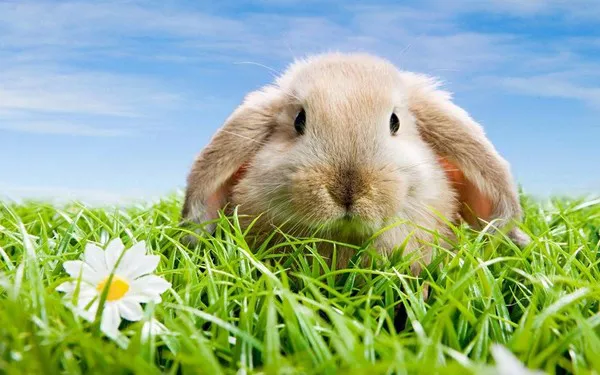Lionhead rabbits, with their distinctive mane of fur resembling a lion’s, are a popular pet choice due to their charming appearance and gentle nature. However, understanding their eating habits is crucial to maintaining their health and wellbeing. One common question among owners is whether Lionhead rabbits eat a lot. This guide will provide a comprehensive look at their dietary needs, consumption patterns, and tips for proper feeding, ensuring your pet stays happy and healthy.
What Lionhead Rabbits Typically Eat
Like all rabbits, Lionheads are herbivores, which means their diet consists exclusively of plant-based foods. Their nutritional intake mainly comes from:
- Hay: The foundation of their diet, essential for digestive health.
- Fresh Vegetables: Leafy greens like romaine lettuce, kale, and parsley.
- Pellets: Commercial rabbit pellets provide additional nutrients.
- Occasional Treats: Fruits or specific rabbit-safe snacks in moderation.
This varied diet is designed to replicate what rabbits would naturally forage in the wild. The amount they consume will depend on their size, age, and activity level.
Do Lionhead Rabbits Eat More Than Other Breeds?
One might wonder if Lionhead rabbits eat more than other breeds due to their unique appearance or metabolism. Generally, Lionhead rabbits have similar dietary requirements compared to other small to medium rabbit breeds. Their intake is largely influenced by their body weight and overall health rather than breed alone. Typically, a Lionhead rabbit‘s food consumption aligns closely with what is recommended for rabbits of similar size.
However, individual rabbits can vary. Some may be more active and thus eat slightly more, while others are less active and may consume less. It’s important to monitor your pet’s eating habits to ensure they are neither overeating nor under-eating.
How Much Should a Lionhead Rabbit Eat Daily?
A healthy Lionhead rabbit’s daily food intake includes a balance of hay, fresh vegetables, and pellets. Here’s a general guideline for daily consumption:
- Hay: Unlimited access to fresh hay is essential. Hay should make up about 80% of their diet, as it supports digestion and dental health.
- Fresh Vegetables: Approximately 1 to 2 cups of leafy greens daily. Avoid feeding iceberg lettuce and other watery or low-nutrient greens.
- Pellets: Around 1/4 cup per 5 pounds of body weight, provided once or twice daily.
- Fresh Water: Always available and changed daily.
This guideline ensures the rabbit receives proper nutrients without excessive calorie intake that could lead to obesity.
Factors Influencing How Much Lionhead Rabbits Eat
Several factors can affect the amount of food your Lionhead rabbit consumes:
- Age: Younger rabbits generally eat more as they grow, while older rabbits may eat less.
- Activity Level: More active rabbits burn more energy and thus need more food.
- Health Status: Illness or dental problems can reduce appetite.
- Season: Rabbits may eat less during warmer months due to reduced energy needs.
- Stress: Changes in environment or routine can influence appetite.
Monitoring these factors will help you adjust feeding amounts appropriately to maintain your rabbit’s health.
The Importance of Hay in a Lionhead Rabbit’s Diet
Hay is by far the most important component in a Lionhead rabbit’s diet. It serves several critical functions:
- Digestive Health: The fiber in hay aids in proper gut movement, preventing gastrointestinal stasis.
- Dental Care: Chewing hay naturally wears down their continuously growing teeth.
- Nutritional Balance: High-fiber content keeps their digestive system functioning smoothly.
You should provide your Lionhead with unlimited access to fresh, high-quality hay such as Timothy, orchard grass, or meadow hay. This ensures they eat enough fiber every day without overeating calorie-dense foods.
Fresh Vegetables: Variety and Quantity
Fresh vegetables are essential to supply vitamins and minerals missing from hay and pellets. Leafy greens such as:
- Romaine lettuce
- Kale
- Cilantro
- Parsley
- Dandelion greens
should be offered daily in quantities of about 1 to 2 cups. Introduce new vegetables gradually to avoid digestive upset. Avoid vegetables high in oxalates or those that can cause gas, such as cabbage or broccoli, unless given sparingly.
Pellets: What Role Do They Play?
Commercial pellets can complement a Lionhead rabbit’s diet by providing concentrated nutrients. However, they should not replace hay or fresh vegetables. Too many pellets can lead to obesity and digestive problems.
Quality pellets should be:
- High in fiber (18% or more)
- Free from added sugars or artificial ingredients
- Fed according to the rabbit’s weight (about 1/4 cup per 5 pounds daily)
Always consult a veterinarian to select pellets suitable for your Lionhead rabbit’s specific needs.
Treats: When and How to Offer Them
Treats should be given sparingly and should never replace balanced meals. Suitable treats include small pieces of fruit like apple slices or berries, but only once or twice a week to avoid excess sugar intake. Avoid sugary human foods or anything toxic to rabbits, such as chocolate or onions.
Signs Your Lionhead Rabbit May Be Eating Too Much
Overfeeding can cause serious health issues like obesity, dental problems, and gastrointestinal upset. Signs of overeating include:
- Weight gain or difficulty moving
- Excessive droppings or diarrhea
- Lethargy or reluctance to exercise
If you notice these symptoms, reduce pellet and treat portions and increase hay intake.
Signs Your Lionhead Rabbit May Be Eating Too Little
On the other hand, under-eating can be a sign of illness. Symptoms include:
- Weight loss or thin body condition
- Small or no droppings
- Lethargy or signs of pain
If your rabbit refuses food for more than 12 hours, consult a veterinarian immediately, as rabbits are prone to digestive blockages.
Feeding Schedule and Routine
Establishing a regular feeding schedule helps maintain your Lionhead rabbit’s digestive health. Most rabbits do well with:
- Hay available 24/7
- Pellets given once or twice daily, ideally in the morning and evening
- Fresh vegetables offered once daily, preferably in the morning
Consistency helps prevent digestive disturbances and encourages a healthy appetite.
Water: The Often Overlooked Essential
Water is vital for every rabbit’s health. Always provide clean, fresh water in a bowl or bottle and refill it daily. Dehydration can lead to serious complications, especially if combined with inadequate fiber intake.
Common Feeding Mistakes to Avoid
Some frequent feeding errors that can harm Lionhead rabbits include:
- Feeding too many pellets or sugary treats
- Providing low-fiber foods or iceberg lettuce
- Sudden diet changes without gradual introduction
- Neglecting fresh water supply
Avoiding these pitfalls ensures your rabbit stays healthy and happy.
Summary
In summary, Lionhead rabbits do not eat excessively compared to other rabbit breeds. Their diet should focus mainly on unlimited hay, supplemented with fresh vegetables and limited pellets. The quantity depends on their age, weight, activity, and health. Monitoring their food intake and adjusting portions as needed is essential to prevent health problems related to overeating or under-eating.
FAQs
Q1: Can Lionhead rabbits eat the same foods as other rabbits?
Yes, Lionhead rabbits have similar dietary needs as other breeds, requiring mainly hay, fresh vegetables, and pellets.
Q2: How much hay should I give my Lionhead rabbit?
Hay should be available at all times, making up about 80% of their daily diet.
Q3: Is it okay to give my Lionhead rabbit fruit as a treat?
Fruits can be given occasionally in small amounts due to their sugar content, about once or twice a week.
Q4: What happens if my Lionhead rabbit overeats pellets?
Overeating pellets can cause obesity and digestive problems. Always feed pellets in moderation.
Q5: How do I know if my Lionhead rabbit is eating too little?
Signs include weight loss, reduced droppings, and lethargy. Consult a vet if your rabbit refuses food for more than 12 hours.
Q6: Can Lionhead rabbits eat iceberg lettuce?
No, iceberg lettuce is low in nutrients and can cause digestive upset; it should be avoided.
Related Topics:






















